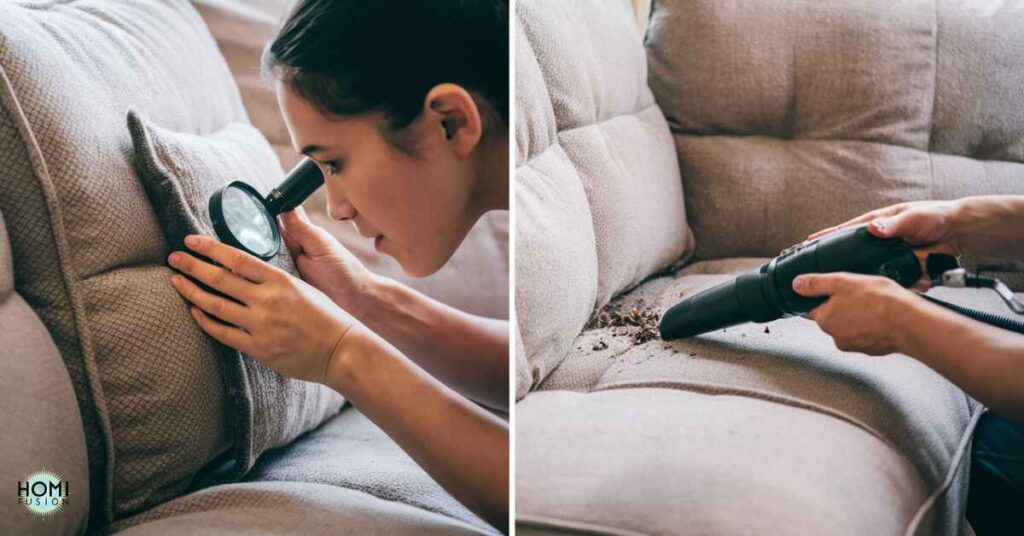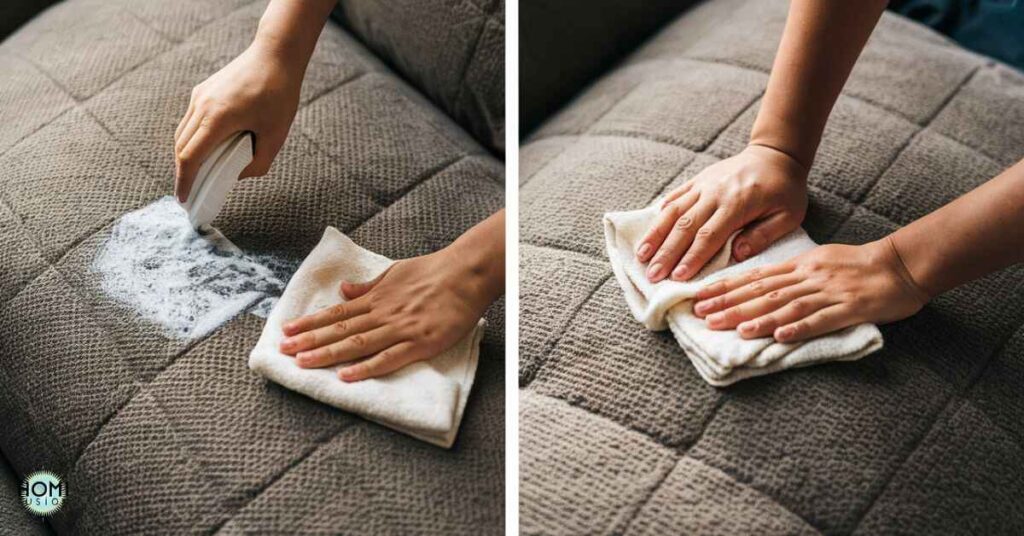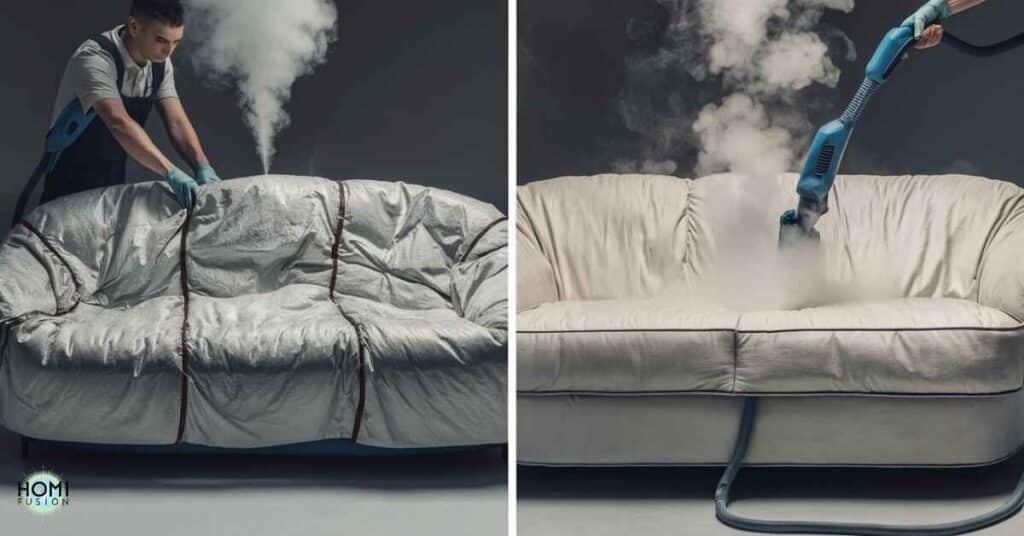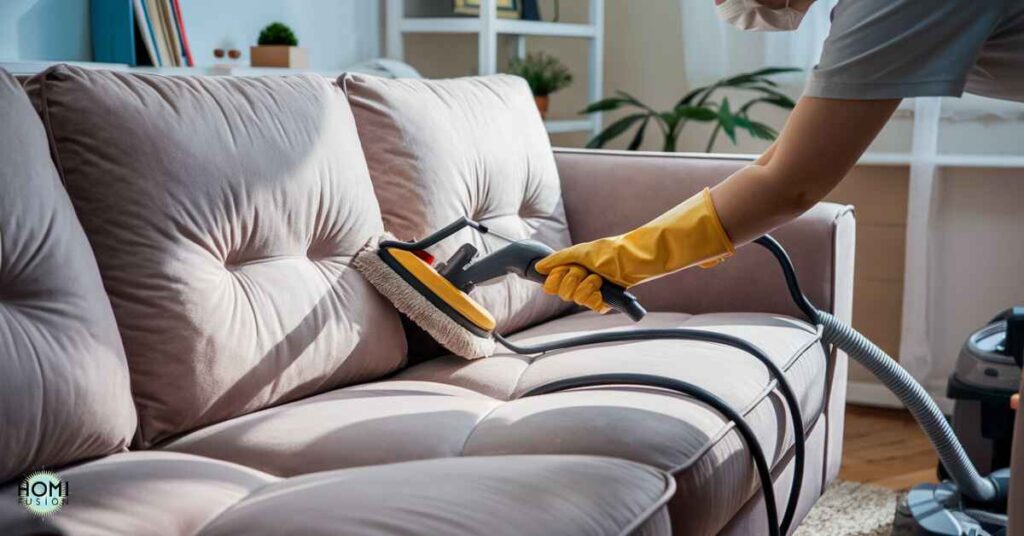Whether you’ve invested in a plush polyester sofa for its stain resistance, affordability, or low-maintenance upkeep, keeping it clean is crucial. This guide will walk you through everything you need to know about cleaning your polyester couch, from tackling spills and odors to deep-cleaning methods. Let’s dive in!
What Is Polyester?
Polyester is a synthetic fabric made from plastic polymers called polyethylene terephthalate (PET). Unlike natural fibers like cotton or wool, polyester is entirely man-made, resulting in a durable, long-lasting material that resists wrinkles, stains, and moisture.
Polyester’s unique properties make it an excellent choice for upholstery. It can withstand frequent use and is easier to clean compared to some natural fabrics.
Is Polyester Couches Eco-friendly?

As a petroleum-based product, polyester isn’t biodegradable. However, it is 100% recyclable, making it a more eco-conscious choice than non-recyclable materials.
Many furniture manufacturers prioritize sustainability, like Transformer Table. They use responsibly sourced wood and eco-friendly practices in their polyester couch construction.
Pros and Cons of a Polyester Couch
Like any fabric, polyester has its advantages and disadvantages. Let’s explore them:
Pros
- Durability: Polyester fibers are incredibly resilient and can withstand heavy use without losing shape or stretching out.
- Stain resistance: The tightly woven polyester fabric repels spills, making stains easier to clean.
- Water resistance: Polyester doesn’t absorb moisture, preventing mildew growth and odors.
- Easy maintenance: Vacuuming and spot-cleaning are often sufficient for basic polyester couch care.
- Wrinkle resistance: Unlike natural fabrics, polyester doesn’t crease or wrinkle easily.
- Cost-effective: Polyester is generally more affordable than high-end natural upholstery fabrics.
Cons
- Lack of breathability: Polyester doesn’t wick moisture away, potentially leading to a “clingy” feeling in humid environments.
Is A Polyester Couch Good For Pets?
Absolutely! Polyester’s stain-resistant and durable nature make it an excellent choice for pet owners. Here’s why:
- Easy hair removal: Pet hair can be easily removed from polyester fabric using a lint roller, vacuum, or damp cloth.
- Stain resistance: Accidents happen, but polyester’s tight weave helps prevent pet stains from setting in.
- Washable covers: Many polyester couches feature removable covers that can be machine-washed, eliminating odors.
- Sturdy construction: Look for polyester couches with solid wood frames and high-density foam cushions to withstand scratching and heavy use from pets.
- Modular designs: Modular sectional sofas, like those from Transformer Couch, allow you to rearrange or expand the couch as your needs change, accommodating multiple pets or rearranging for more space.
Precautionary Measures Before Cleaning A Polyester Couch
Before diving into cleaning, follow these essential steps to prepare your polyester couch:
Check for bugs and parasites

Inspect your couch thoroughly for any signs of pests like dust mites, bed bugs, fleas, or moths. If you suspect an infestation, steam cleaning or professional pest control may be necessary to eliminate these unwanted guests safely.
Pro Tip: Use a steam cleaner with adjustable temperature settings, as excessive heat can potentially melt or damage polyester fabric.
Spot treat any stains
While polyester is stain-resistant, it’s best to tackle fresh spills or stains immediately. Blot (don’t rub!) the affected area with a clean cloth or paper towel to absorb as much of the spill as possible.
For stubborn stains, use a plant-based stain remover or mix a solution of mild dish soap and distilled white vinegar. Test the solution on an inconspicuous area first to ensure it doesn’t discolor the fabric.
Use a dry brush, then a hand-held vacuum to remove visible dirt
Start by dry brushing the entire couch to loosen any dirt, pet hair, or debris caught in the fabric. Then, use the upholstery attachment on your vacuum to remove the loosened particles thoroughly.
Prepare the cleaning solution
Check your polyester couch’s cleaning code (typically found on a tag) to determine the appropriate cleaning solution:
- W: Use a water-based cleaner, like a mild detergent and water solution.
- S: Use a solvent-based cleaner specifically formulated for upholstery.
- S/W: Either a water-based or solvent-based cleaner is suitable.
- X: Professional cleaning is recommended.
Do a spot test on a small, hidden area of the couch
Before applying any cleaning solution to the entire couch, test it on a small, inconspicuous area first. This will help you identify any potential discoloration or adverse reactions to the cleaner.
Apply the solution and start wiping

Lightly mist or sponge the cleaning solution onto the polyester fabric, being careful not to oversaturate it. Use a soft-bristle brush or sponge to gently agitate the solution into the fabric, working in sections from top to bottom.
Rinse your sponge or brush frequently in clean water to avoid spreading dirt or soap residue.
Wipe off with a microfiber and let it air dry
Once you’ve cleaned the entire couch, use a clean, damp microfiber cloth to wipe away any remaining cleaning solution. Avoid leaving soap residue, as this can attract dirt and cause future staining.
Allow the polyester couch to air dry completely before using or replacing cushion covers. Open windows or use fans to improve ventilation and speed up the drying process.
Read this blog
What Is A Coach House?
Cleaning Methods
Depending on your couch’s level of grime and how often it’s used, you may need to alternate between quick cleaning and deep cleaning methods.
Quick Clean
For a weekly refresh or light maintenance, follow these simple steps:
- Dry brush: Use a soft-bristle brush or lint roller to remove surface dirt, pet hair, and debris.
- Vacuum: Thoroughly vacuum the couch, paying close attention to crevices and under cushions.
- Spot clean: Treat any visible stains or spills with a suitable spot cleaner.
Deep Clean
Every few months (or as needed), give your polyester couch a more thorough cleaning:
- Dry brush and vacuum: Start with the quick clean steps above.
- Deodorize: Sprinkle baking soda liberally over the entire couch and let it sit for 20-30 minutes to absorb odors. Vacuum up the baking soda.
- Spot treat stains: Use a stain remover or cleaning solution to tackle any remaining stains, following the steps outlined earlier.
- Steam clean (optional): For a deeper clean, consider renting a steam cleaner designed for upholstery. The high-temperature steam can help lift embedded dirt and grime from the polyester fibers.
- Machine wash removable covers: If your polyester couch has removable covers, follow the manufacturer’s instructions for machine washing and drying them.
Cleaning Solutions, Tips & Tricks
While store-bought upholstery cleaners are convenient, you can also whip up effective cleaning solutions using common household ingredients:
Dab, Don’t Rub
When addressing spills or stains, always dab or blot the affected area with a clean cloth or paper towel. Rubbing can grind the stain deeper into the polyester fabric, making it harder to remove.
White Vinegar
Create a versatile cleaning solution by mixing equal parts white vinegar, warm water, and a few drops of mild dish soap. The vinegar’s acidity helps break down tough stains, while the soap lifts and rinses away dirt and grime.
Lemon Juice
Lemon juice’s natural acidity makes it an excellent odor eliminator and whitening agent for polyester fabric. Dilute lemon juice with water before applying to avoid potential discoloration.
Baking Soda
Baking soda is a tried-and-true deodorizer for couches. Sprinkle it liberally over the polyester fabric, let it sit for 20-30 minutes, and then vacuum it up. The baking soda will absorb any lingering odors, leaving your couch fresh and clean
Laundry Detergent
For removable polyester couch covers, machine washing with your regular laundry detergent is a simple and effective way to remove built-up grime. It also helps refresh the fabric. Follow the manufacturer’s instructions for washing and drying to maintain the covers’ shape and color vibrancy.
Steam Clean
Steam cleaning is an excellent option for deep cleaning polyester couches. The high-temperature steam helps break down and lift trapped dirt, grime, and stains from the polyester fibers. This is achieved without the need for harsh chemical cleaners.

The steam penetrates deep into the fabric, killing germs and bacteria while gently lifting embedded particles. This gentle yet effective method reduces the risk of damaging or weakening the polyester fabric over time.
After steam cleaning, be sure to allow your polyester couch to air dry completely before using it again.
Things to Avoid When Cleaning Your Polyester Couch
While polyester is a durable fabric, certain ingredients or cleaning methods can potentially cause discoloration, damage, or premature wear. Here’s what to steer clear of:
Ingredients That May Cause Discoloration
- Bleach and bleach-based cleaners
- Ammonia-based cleaners
- Harsh solvents or degreasers
Always check the labels of any cleaning products you plan to use on your polyester couch. Avoid those containing these ingredients.
Ingredients That May Destroy Polyester
- Acetone
- Trichloroethylene (TCE)
- Concentrated acids or bases
These powerful chemicals can break down and degrade polyester fibers, leading to irreparable damage and premature couch replacement.
Other Precautions
- Avoid excessive scrubbing or rubbing, which can cause pilling or fuzzing of the polyester fabric.
- Don’t oversaturate the couch with cleaning solutions, as excessive moisture can seep into the cushions and cause mildew growth.
- Use caution with heat sources like hair dryers or space heaters, as extreme heat can potentially melt or warp the polyester fibers.
Also Read
A Guide To Choosing The Best Washing Machine: Criterion Washer Reviews
Frequently asked questions
Can you use vinegar to clean a polyester couch?
Yes, vinegar is an excellent cleaning solution for polyester couches. Create a mixture of equal parts white vinegar, warm water, and a few drops of mild dish soap. The vinegar’s acidity helps break down tough stains, while the soap lifts and rinses away dirt and grime. Always test the solution on a small, inconspicuous area first to ensure it doesn’t discolor the fabric.
How do you get stains out of a polyester couch?
For fresh stains, blot the area with a clean cloth or paper towel to absorb as much of the spill as possible. Then, treat the stain with a plant-based stain remover or a solution of mild dish soap and distilled white vinegar. For set-in stains, consider renting a steam cleaner designed for upholstery, as the high-temperature steam can help lift embedded stains from the polyester fibers.
Can you use baking soda to clean a polyester couch?
Baking soda is an excellent deodorizer for polyester couches. Sprinkle it liberally over the fabric, let it sit for 20-30 minutes to absorb odors, and then vacuum it up. You can also create a paste with baking soda and water to spot-treat stubborn stains before vacuuming.
How do you clean a smelly polyester couch?
For odor removal, start by sprinkling baking soda over the entire couch and letting it sit for 20-30 minutes before vacuuming. You can also try diluted lemon juice, which acts as a natural odor eliminator and whitening agent for polyester fabric. If odors persist, consider steam cleaning or machine washing removable covers with a mild detergent.
Can you steam clean a polyester couch?
Yes, steam cleaning is an excellent option for deep cleaning polyester couches. The high-temperature steam helps break down and lift trapped dirt, grime and stains from the polyester fibers without the need for harsh chemical cleaners.
How often should you clean a polyester couch?
For light maintenance, give your polyester couch a quick clean (dry brushing, vacuuming and spot cleaning) on a weekly basis. Every few months, or as needed based on usage and visible grime, conduct a deep clean.
Conclusion
Keeping your polyester sofa clean and well-maintained is essential for preserving its appearance, comfort, and longevity. By following the precautionary measures, cleaning methods, and tips outlined in this guide, you can effectively tackle spills, odors, and general grime. This helps protect your couch’s polyester fabric.
Regular quick cleans and periodic deep cleanings, combined with spot treatments as needed, are the keys to maintaining a fresh, inviting polyester couch. This approach will ensure it looks and feels like new for years to come.
Whether you’re a pet owner, have kids, or simply want to extend the life of your investment, this comprehensive guide has you covered. Say goodbye to stains, odors, and unsightly grime-your polyester sofa is about to look and smell its absolute best!







